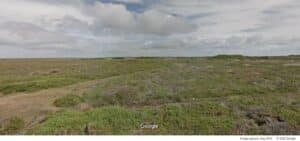Support us from £3/month
We deal with almost 1000 cases a year assisting communities, groups and individuals in protecting their local spaces and paths in all parts of England and Wales. Can you help us by joining as a member?
The extensive Lizard Downs in west Cornwall has been registered as common land, thanks to our efforts.
The land, which is 116 hectares of splendid open moorland, failed to be finally registered as common during the three-year period allowed by the Commons Registration Act 1965. Part 1 of the Commons Act 2006 re-opened the door for the registration of the land provided it remains today ‘open, uncultivated and unoccupied’.

Lizard Downs, now registered as common land. Photo: Google
Under the 1965 Act, Lizard Downs was provisionally registered as common land but the registration was cancelled owing to objections. [1] However, in the late nineteenth century and under the Inclosure and Regulation (Lizard Common) Provisional Orders Confirmation Act 1880, Lizard Downs was recognised as common land. The proposed inclosure [2] authorised by the Act did not take place owing to the expense of implementation.
The recognition of the land as common land under the nineteenth-century legislation, ie qualifying for inclosure (but never inclosed), meant that it could be considered for registration under the Commons Act 2006.
In 2020, the society applied to Cornwall Council to register the land, and it provided evidence of the 1880 Act and plans. The council agreed with the society that the land met the criteria for registration and has added it to the common-land register.
Says Frances Kerner, our commons re-registration officer who carried out the research: ‘I am delighted that the recognition of the land as common land well over 100 years ago has now been acknowledged. While the land is managed by Natural England and is part of the Lizard National Nature Reserve, its registration as common land confers additional protection, and a right for the public to walk there, for all time.’
[1] Two hearings by a commons commissioner were held. The commissioner decided that the land was not waste land of a manor and did not therefore meet the criteria for registration.
[2] ‘Inclosure’ means the extinguishment of rights exercisable over common land, and usually involves the allocation of ownership to individual farmers and the enclosure of the land into fields. Most commons in England were inclosed between the seventeenth and end of the nineteenth centuries, leaving around 3% of England as common land today. Lizard Downs is a rare case where inclosure was authorised but never put into effect.
